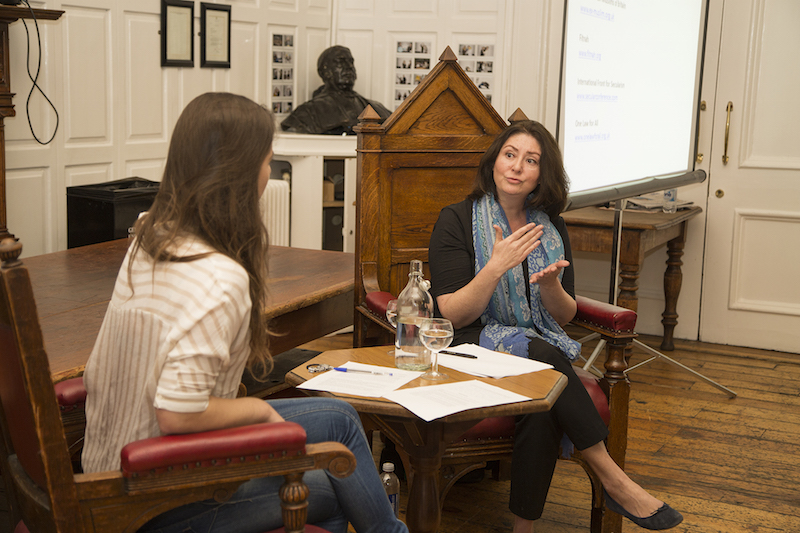
Human rights activist Maryam Namazie, who last year accused Trinity of placing extraordinary conditions on a talk she was due to give to the Society for International Affairs (SOFIA), spoke to the University Philosophical Society (the Phil) on her take on Islamism, radical blasphemy, and the evils of multiculturalism.
An ex-Muslim Iranian who was forced to flee Iran in 1979 following the Islamic Revolution, she is a spokesperson for Iran Solidarity, One Law for All, Fitnah – Movement for Women’s Liberation and the leader of The Council of Ex-Muslims of Britain as well as being a Central Committee member of the Worker-communist Party of Iran.
In her talk she was quick to level a galling criticism at universities, including Trinity. She contended that “it’s no longer a defence of unconditional free expression that is progressive but a defence of censorship.” This reproach is similar to that made by Brendan O’Neill, who bemoaned “the war of offensiveness on campus” two weeks ago during a Thursday night Phil debate and subsequently caused controversy when he accused Trinity students of supporting justifications for the Charlie Hebdo massacre, and being overly politically correct.
While the controversy surrounding Namazie’s event with SOFIA last year hinged on her accusing Trinity of placing conditions on her talk, the College said that it “had no involvement” in discussions with her. The University Times learned that the controversy actually resulted from a series of miscommunications between the student and Namazie, rather than actual attempts on anyone’s part to interfere with her talk.
Namazie, nonetheless, believes it was an act of censorship. Last month, she was barred from speaking at Warwick University because its student union said she could incite hatred on campus if she was allowed to take up an invitation from a society. While those defending religion are “given free access”, those criticising it are “regularly barred or face restrictions”, she contends.
Conversely, Namazie’s only qualification to free expression concerns incitement to violence, which she condemns. Otherwise, she believes “bad ideas should be challenged in public with better ideas”, because “you can’t stop bigotry with censorship”, and that is why “free speech should be unconditional.”
For Namazie, the censorship on campus is part of a wider societal trend in the West. Here the “Postmodernist leftists” are her target. She reprimands them for multiculturalism and cultural relativism. While multiculturalism is usually lauded, she criticises it for a dogmatic tolerance of any belief or culture, regardless of its toxicity. And she sees cultural relativism as being used as an excusal of Islamism, the ideology that underpins the Islamic State, on the grounds that one cannot condemn it, because “it’s all relative”.
She asserts that the sanctification of Islam as a sacred cow beyond criticism in the West has been encouraged by the Islamists. Islamophobia, she claims, is “a political term coined by (them) to scaremonger people into silence.” And that de facto blasphemy laws have been imposed “under the pretext of respect for Muslim sensibilities”. Discourse about Islam has been limited to “that which is acceptable for the Islamists, because it is they who determine what the limits are.” “Much of the left and liberals, including many student unions,” she argues, “have bought into the Islamist narrative.”
Moreover, “Islamism is constantly justified and apologised for and legitimised by many Western governments”, who are “friends of many conservative states, from the Saudi regime, to the Gulf states, to the Iranian regime.” What’s more, she says, Islamism was fostered during the Cold War, when there was a move by Western powers “to create an Islamic belt around the Soviet Union”. It is, she thinks, “common knowledge that the US funded the mujahideen, that became the Taliban in Afghanistan.”
But Namazie can perceive the remedy as well as the ailment. Her great appeal to students is to “celebrate blasphemy and apostasy.” She sees the lack of access for blasphemers, such as she, as being an age-old imbalance. “The critics of religion have never been free to express themselves,” she argues. “It’s the blasphemers and apostates, who have been persecuted throughout the ages.” While “clerics have always been free to promote religion.”
That is why she is exhorting students to embrace blasphemy, for its radical possibilities. Criticism of religion is at the centre of the struggle for change”, she contends. Especially in places like Iran and Saudi Arabia, where “criticism of religion and criticism of the state are analogous.” Namazie can see a “tsunami of atheism, free-thought and secularism” waiting to challenge Islamism but we need to stop being obstacles to dissent.
“Our age is the age of ISIS but it’s also the age of incredible human resistance and anti-Islamic backlash and Enlightenment.”






